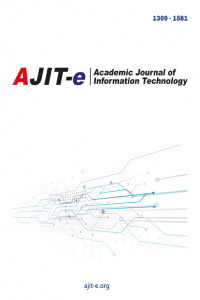Uluslarüstü Bir Medya Teorisine Doğru
Uluslarüstü Medya Teorisi, Uluslararası Medya, Ebedi Barış, Dünya Vatandaşlığı, Kozmopolitanizm, Enformasyonel Uluslarüstücülük, Uluslarüstü Birlikler
Towards A Supranational Media Theory
Supranational Media Theory, International Media, World Citizenship, Cosmopolitanism, Informational Supranationalism, Supranational s,
___
- Asamoah, O. (1966). The Legal Effect of Resolutions of the General Assembly. Colum. J. Transnat'l L., 3, 210, 159, 243.
- BBC. (2018, April 4). Facebook scandal “hit 87 million users”. http://www.bbc.com/news/technology43649018
- Bentham, J. (1970). An Introduction to the Principles of Morals and Legislation. (J. B. Hart, Dü.) London: Oxford University Press.
- Boyd-Barrett. (1977). Media imperialism: towards an international framework for the analysis of media systems. Mass Communication and Society, 16-135.
- CNNPR (2017). Twitter. Twitter Inc.: https://twitter.com/CNNPR/status/934559957713932290 / November 25.
- De Lombaerde, P. (2008). International Integration and Societal Progress: A Critical Review of Globalisation Indicators. A Critical Review of Globalisastion Indicators, 327-331.
- Einstein, A. (2002, May). Why Socialism. Monthly Review, 56-62.
- Fisk, R. (2001). Al Jazeera: A bold and Original TV Station. Independent. October 11, 2001.
- FCC (2018, October 1). The Federal Communications Commission. fcc.gov: https://www.fcc.gov/about-fcc/what-we-do
- Hobson, J. M. (2004). The Eastern Origins of Western Civilisation. London: Press Syndicate of the University of Cambridge.
- Huntington, S. P. (1993). The Clash of Civilizations. Foreign Affairs, 22-49.
- Hong, Sungook. (2001) Wireless: From Marconi's Black-box to the Audion, MIT Press.
- Joseph Oliver Boyd-Barret, S. X. (2008). Al-Jazeera, Phoenix Satellite Television and the Return of the
- State: Case Studies in Market Liberalization, Public Sphere and Media Imperialism. International Journal of Communication, 206-222 .
- Kant, I. (1991). Perpetual Peace: A philosophical Sketch. Cambridge: Cambridge University Press.
- Kipling, R. (2000). Poetry for Young People. (E. Gillooly), New York: Sterling Publishing.
- Laetrius, D. (1895). The Lives and Opinions of Eminent Philosophers. London: George Bell and Sons.
- Lippman, P. (1922). Public Opinion. New York: Harcourt.
- Mahajan, R. (2002). The New Crusade. New York: Monthly Review Press.
- Martin, L. H. (2018). Studies in Hellenistic Religion. (P. Pachis, Dü.) Oregon: Cascade Books.
- Massey, D. (1994). Space, Place and Gender. Minneapolis: University of Minnesota Press. Mcluhan, H. M. (1966). Information Theory. 234.
- Noam Chomsky, E. S. (1998). Manufacturing Consent: The Political Economy of the Mass Media. New York.
- Noelle-Neumann, E. (1974, June 1). The Spiral of Silence a Theory of Public Opinion. Journal of Communication, 43-51.
- Konyukhovskiy, P.V. (2018). Proxy Wars. Discussion Paper: School of Business & Economics, 4, 1.
- Pieterse, J. N. (1994). Globalization as Hybridization. International Sociology, 161-184.
- Postman, N. (1993). Technopoly; The Surrender of Culture to Technology. New York: Vintage Books A Division of Random House, Inc. p.9
- Press, T. A. (2011). Egypt Security Forces Raid Al Jazeera Office in Cairo. www.haaretz.com: https://www.haaretz.com/1.5184782 - September 29, 2011.
- Robertson, A. (1957). Legal Problems of european integration. The European Political Community, 105, 143.
- Said, E. (2004). The Post Colonial Studies Reader Representation and Resistance. (G. G. Bill Ashcroft, Dü.) İstanbul: Routledge.
- Schramm, W. L. (1964). Mass Media and National Development: The Role of Information in the Developing Countries. Stanford University Press, 65.
- Schuman, R. (1950). The Schuman Declaration. http.://www.europa.eu: https://europa.eu/europeanunion/about-eu/symbols/europe-day/schuman-declaration_en - May 9, 1950.
- Tomlinson, J. (1991). Cultural Imperialism: A Critical Introduction. pp. 16-94.
- Toussaint, Y. (1992). La parole électrique. Du minitel aux nouvelles “machines à communiquer. Esprit Presse, 127-139.
- Trump, D. (2017). Twitter Inc.: https://twitter.com/realDonaldTrump/status/934551607596986368 / November 24, 2017.
- UNESCO (1973). Declaration of Guiding Principles on the Use of Satellite Broadcasting for the Free Flow of Information, the Spread of Education, and greater Cultural Exchange. to undertake studies on the consequences which the new techniques of communication by artificial satellites might have on the achievement of UNESCO's objectives. Genev: U.N.
- Warf, B. (2007). Oligopolization of Global Media and Telecommunications and Its Implications for Democracy. Ethics, Place and Environment, 89–105.
- Yayın Aralığı: Yılda 4 Sayı
- Başlangıç: 2010
- Yayıncı: Akademik Bilişim Araştırmaları Derneği
Müşteri Odaklı Sipariş Yanıtlama Sürecine İlişkin Bir Mobil Karar Destek Sistemi
Nilüfer YURTAY, Yüksel YURTAY, Emin GÜNDOĞAR, Hüseyin DEMİRCİ
Uluslarüstü Bir Medya Teorisine Doğru
Ortaokul Öğrencilerinde Bilgisayar Oyun Bağımlılığı Düzeyinin Çeşitli Değişkenlere Göre İncelenmesi
Süreç Madenciliği Araçları Karşılaştırması
Sosyal Ağ Analizi: Literatür İncelemesi
SOLID İlkelerinin Microsoft VS Code Metriğine Etkisinin Deneysel Olarak Değerlendirilmesi
